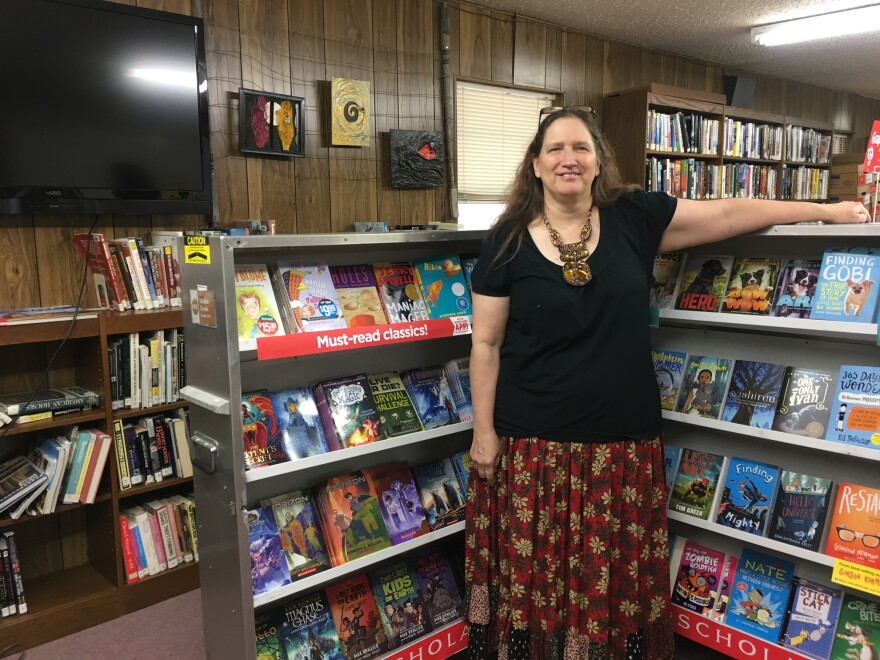Rural libraries in Texas face many challenges — they don’t have a lot of resources, but the people they serve have a lot of needs.
A new effort from Texas Woman’s University in Denton and the Texas Library Association is focused on helping them.
As the director of a small-town library in Denton County, Tina Hager is used to doing everything.
“I help with cataloging. I do personnel. I do customer service, programs, everything,” Hager said.
Hager runs the public library in Ponder, where the population is about 1,500. The town is about a 20-minute drive to the city of Denton.
The library operates out of what used to be City Hall. Hager has one employee — a part-time staffer who works the front desk, tending to patrons.
“I can’t tell you how many times I wish I could hire a part-time person just to do IT and social media because IT is a job in itself and social media is a job in itself,” Hager said. “Because of social media it’s important to get the word out and interact with the people who are making feedback or comments.”

Across Texas, rural libraries like the one in Ponder often don’t have enough staff or enough money. They may only be open a few days a week or staffed by volunteers who aren’t trained as librarians. Yet, Hager says, these libraries are go-to places, especially in small towns.
“Libraries are like the living room of the community and that’s one of the things I try and tell people. ‘I want you to think of this at your home away from home,’” she said “And it’s not only about kids anymore. So many people think, ‘Oh, well, I don’t have kids anymore, or ‘I don’t read.’ So when they say, ‘I don’t like to read,’ I’m like, ‘We got movies! We got movies!”
"Libraries are like the living room of the community."
A new three-year project from Texas Woman’s University and the Texas Library Association aims to help rural libraries become anchors in their towns.
With the help of a nearly $400,000 grant, TWU will select 20 applicants from rural areas and train them to work in libraries and form connections in their community. Those selected will get a master’s degree in library science through TWU’s online program.
“That’s kind of part of the reason for funding,” said Carol Perryman, associate professor in TWU’s Library and Information Studies program. “You know, you get someone in there who’s been taught to write grants, who’s been taught to assess community needs and to work with others like City Hall.”

Perryman said all of the selected applicants will have something in common: They’re involved in their community.
“We want to recruit for people who can serve the underserved population,” said Ling Hwey Jeng, a professor and director of the School of Library and Information Studies at TWU. “A lot of times it’s the people of minority groups and this is not just ethnic and race. This is also geographical, and that’s the reason we want to look at the rural areas, the small communities.”
That includes parts of South Texas and the Rio Grande Valley, West Texas and the area outside San Antonio. The library initiative will focus on serving predominately Latino and Spanish-speaking communities that struggle getting access to social services.
Jeng says the 20 students-turned-librarians could, for example, find a retired teacher to teach an adult literacy class or find someone in business to lead a financial literacy workshop.

“We don’t have to do it ourselves,” Jeng said. “We bring the community into our services, so the community becomes our resource.”
Kate Horan, director of the McAllen Public Library, points out that libraries do more than check out books. Residents rely on it for the internet, especially if they don’t have broadband access at home. Others may go to get help with their resumes.
The library system there serves not only the residents of McAllen but a large swath of the lower Rio Grande Valley, including numerous small towns.
“We run job fairs at our libraries,” Horan said. “Our last one we had about 1,000 people come through the doors that morning to look for jobs, so we are very connected to the community.”
Back in Ponder, library director Tina Hager points out that they also like to have fun.
“I personally like karaoke,” she said with laugh.
Once a week, patrons sing songs like Linda Ronstadt’s "Blue Bayou” and one of Hager's favorites, “Bohemian Rhapsody" by Queen.
“A lot of times, most karaoke is done in bars. OK. And families don’t always feel comfortable going to bars to sing with their family, etc.,” Hager said. “So, I felt like libraries are the perfect place for people to come and just have a totally different atmosphere and enjoy themselves.”






